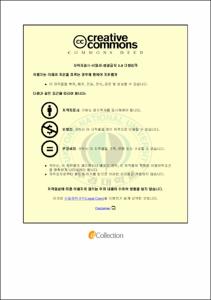보디빌더의 훈련 시 단백질 섭취형태의 차이가 신체조성, 근육 관련 호르몬과 최대근력에 미치는 영향
- Abstract
- Abstract
The purpose of this study was to investigate the effect of bodybuilders' protein intake differences with resistant exercise(weight training) by 12 weeks on muscle related hormones, muscle mass, fat free mass, body fat percentage and 1-RM. Thirty bodybuilders doing weight training more than 1 year in P university were divided into 3 groups: Natural protein(Chicken breast meat) intake group(n=10), Whey protein isolates(WPI) intake group(n=10) and Control group(n=10). Prior to investigation, body composition(muscle mass, fat free mass, body fat percentage) and 1-RM were measured, and blood sample at rest were taken to measure the level of muscle related hormones(insulin, growth hormone, IGF-1, testosterone, cortisol). After investigation, these measurements were performed again.
The results of the study were as follows:
Muscle mass increase in natural protein(p< .001), WPI(p< .001) and control group(not significant). There is no significance between intake groups.
Fat free mass increase in natural protein(p< .001), WPI(p< .001) and control group(not significant). There is no significance between intake groups.
Body fat percentage decrease in natural protein(p< .001), WPI(p< .01) and control group(not significant). There is no significance between intake groups.
Insulin increase in natural protein(not significant), WPI(not significant) and control group(p< .05). There is no significance between intake groups.
Growth hormone increase in natural protein(p< .05), WPI(not significant) and control group(p< .05). There is no significance between intake groups.
IGF-1 increase in natural protein(p< .001), WPI(not significant) and control group(not significant). There is no significance between intake groups.
Testosterone increase in natural protein(p< .05), WPI(not significant) but decrease in control group(not significant). There is the significant difference(p< .05) between intake groups.
Cortisol decrease in natural protein(not significant), but increase in WPI(p< .001), control group(p< .001). There is the significant difference(p< .001) between intake groups.
Upper body 1-RM increase in natural protein(p< .001), WPI(p< .01) and control group(p< .05). There is no significance between intake groups.
Lower body 1-RM increase in natural protein(p< .001), WPI(p< .01) and control group(not significant). There is the significant difference(p< .05) between intake groups.
This study suggested that protein intake difference with resistance exercise affect the change of body composition, muscle related hormones and 1-RM. Therefore, the study is effective to give the good information of weight training nutrition to sports person as well as bodybuilder.
Key words: bodybuilder, weight training, protein, hormone, body composition, 1-RM
- Issued Date
- 2012
- Awarded Date
- 2012. 8
- Type
- Dissertation
- Publisher
- 부경대학교
- Affiliation
- 부경대학교 대학원
- Department
- 대학원 체육학과
- Advisor
- 신군수
- Table Of Contents
- 목 차
Ⅰ. 서론 1
1. 연구의 필요성 1
2. 연구의 목적 4
3. 연구의 문제 5
4. 연구의 제한점 5
5. 약어 및 용어의 정의 6
Ⅱ. 이론적 배경 9
1. 보디빌딩의 역사 9
2. 보디빌딩의 특징 11
3. 천연단백질과 WPI(whey protein isolates) 12
4. 근육 관련 호르몬 15
5. 근육 관련 호르몬과 근육의 성장 17
6. 신체조성 19
7. 최대근력 21
Ⅲ. 연구방법 23
1. 연구 대상 23
2. 측정 항목 24
3. 측정 방법 24
4. 실험계획 및 방법 27
5. 자료처리 방법 33
Ⅳ. 결과 34
1. 신체조성의 변화 34
2. 근육 관련 호르몬의 변화 39
3. 최대근력의 변화 48
Ⅴ. 논의 52
1. 신체조성의 변화 52
2. 근육 관련 호르몬의 변화 57
3. 최대근력의 변화 67
Ⅵ. 결론 70
참고문헌 74
- Degree
- Doctor
- Files in This Item:
-
-
Download
 보디빌더의 훈련 시 단백질 섭취형태의 차이가 신체조성, 근육 관련 호르몬과 최대근력에 미치는 영향.pdf
기타 데이터 / 3.77 MB / Adobe PDF
보디빌더의 훈련 시 단백질 섭취형태의 차이가 신체조성, 근육 관련 호르몬과 최대근력에 미치는 영향.pdf
기타 데이터 / 3.77 MB / Adobe PDF
-
Items in Repository are protected by copyright, with all rights reserved, unless otherwise indicated.